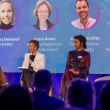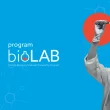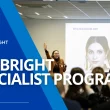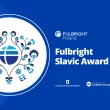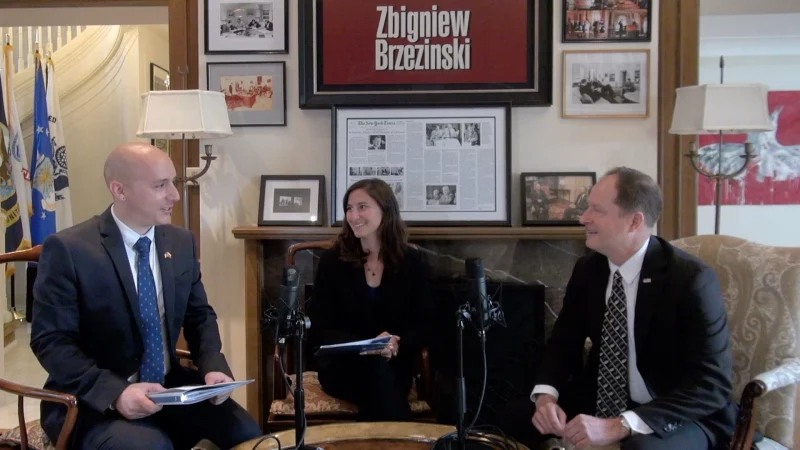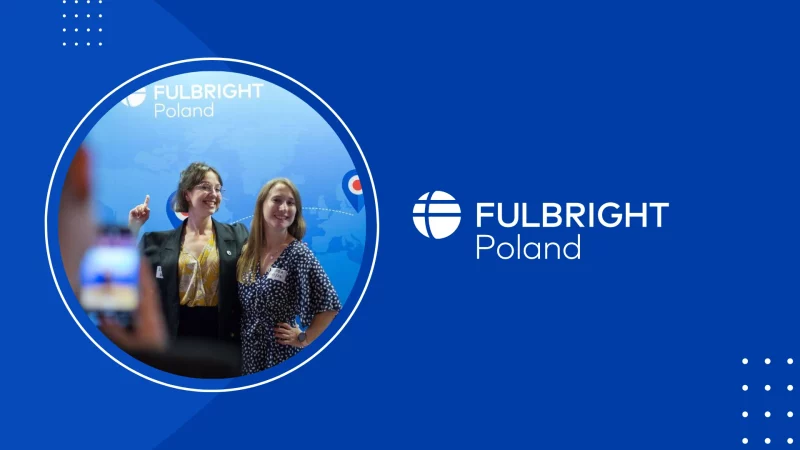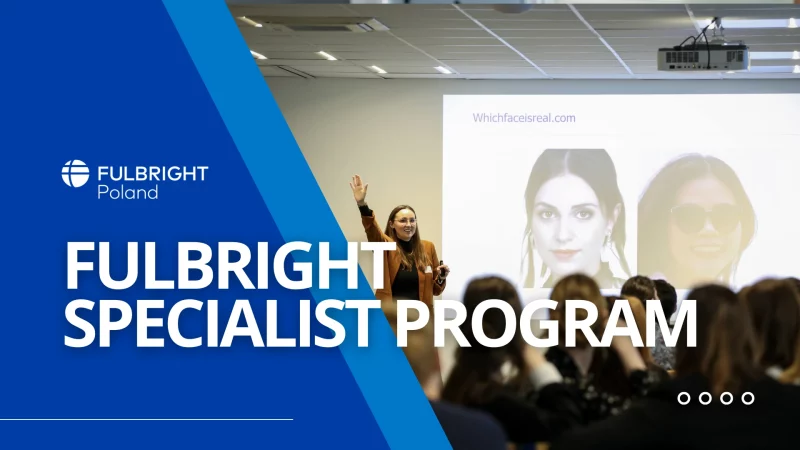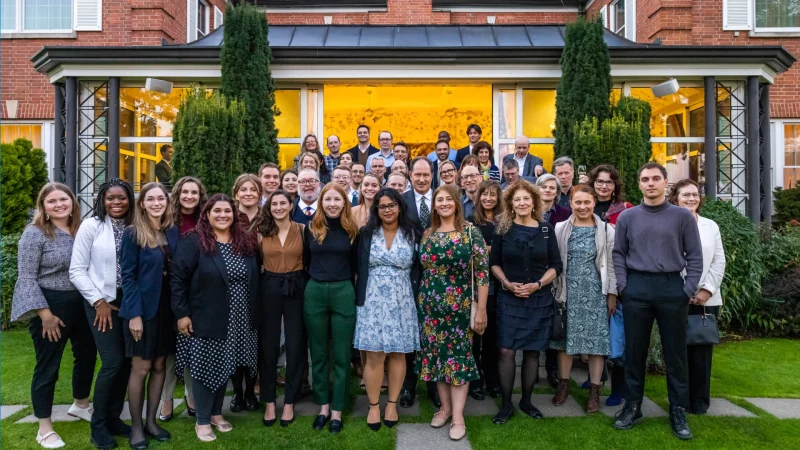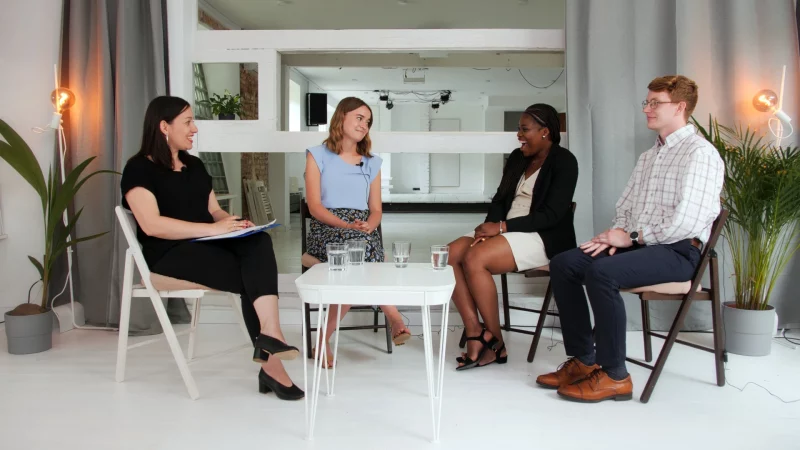We are pleased to share the newest episode of the Fulbright PULSE podcast, where engaging discussions and insightful reflections took center stage. In this installment, our recent alumni, Madalyn Fernbach and Jeremy Wexler, had the distinct honor of conversing with Ambassador Mark Brzezinski, the current United States Ambassador to Poland since 2022, a seasoned diplomat, lawyer and a Fulbright alumnus too.
They talk about favourite places and food in Poland, international security and politics, advices for personal growth as well as Ambassador’s experience as a Fulbrighter to Poland in the early 1990s. Part of the questions asked in the interview have been collected among Polish high school students Maddie and Jeremy met during their outreach activities while in Poland.
Speakers
Madalyn Fernbach is a 2019 graduate from Stonehill College with a B.S in neuroscience, she spent two academic years as an English Teaching Assistant to Poland (Łódź in 2021-2022 and 2022-2023) and currently is a medical student at Penn State College of Medicine in their University Park Program.
Jeremy Wexler is a composer, drummer and percussionist from Long Island, New York. Jeremy spent the 2021-2022 academic year in Poland (Kraków) as a Fulbright US Student Reseacher studying electroacoustic composition. He has recently obtained a PhD degree in music composition at the University of California, Berkeley.
Mark Brzezinski graduated from Dartmouth College with a Bachelor of Arts, earned a Juris Doctor from the University of Virginia Law School, and obtained a PhD in political science from Oxford. He studied on a Fulbright grant in Warsaw from 1991 to 1993 and was later named by President Obama to the Fulbright Foreign Scholarship Board. During his career, he also served as the US Ambassador to Sweden and as a director of Bill Clinton’s National Security Council in the White House.
Listen to Fulbright PULSE
Fulbright PULSE is available on Spotify and Apple Podcasts.
Transcript
Hello and welcome to the Fulbright Pulse Podcast. My name is Madalyn Fernbach, and I am an alumna of Fulbright Poland. During my Fulbright experience, I served as an English teaching assistant at the Medical University of Łódź, where I taught advanced-level English in the sciences to doctoral, medical, and master’s students.
J: And my name is Jeremy Wexler. I am also an alumnus of Fulbright Poland, where I had the privilege of being a researcher in residence at the Krzysztof Penderecki Academy of Music in Kraków. During my time there, I focused on writing my doctoral dissertation in music composition.
Today, we are excited to share with you an interview we conducted with the current US Ambassador to Poland, Mark Brzezinski. Ambassador Brzezinski was sworn in on January 19th, 2022, and he previously served as the US Ambassador to Sweden. He was also a member of President Bill Clinton’s National Security Council Staff. Prior to that, he attended Dartmouth College, received his law degree from the University of Virginia, and earned his doctorate in Political Science at Oxford University.
Ambassador Brzezinski comes from a Polish-American Family. He is the son of Zbigniew Brzezinski, who was President Jimmy Carter’s National Security adviser from 1977 to 1981. He is also the brother of MSNBC host Mika Brzezinski, and of military expert Ian Brzezinski. Finally, he is a proud Fulbright alumnus who lived in Warsaw from 1991 to 1993. In this interview, we cover a wide range of topics from the personal to the political. We hope you enjoy the podcast.
[transitional music]Hello, my name is Jeremy Wexler.
And my name is Madalyn Fernbach.
And we are both alumni from the Fulbright Poland Program. Today we have the distinct privilege to be joined by Fulbright alumnus and US ambassador to Poland Ambassador Mark Brzezinski, for a Fulbrighter to Fulbrighter interview. Mr Ambassador, thank you so much for joining us today for this.
B: Jeremy and Maddy, welcome here, I can’t wait to talk about my Fulbrigth experience and your Fulbright experiences – because there’s something incredibly special about that opportunity, so thank you for coming today.
Thank you for having us.
Yeah, we’re excited, and this is a real Fulbrighter experience- cause the sound equipment we’re using today was used as a part of Jeremy’s research project for Fulbright last year.
Oh, fantastic!
And questions have been gathered from Polish students as part of Maddy’s English Teaching Assistant Experience.
That I love, because engagement with the people in the country that you go to as a Fulbrighter is so, so important. So I’m looking forward to hearing those questions; that’s super cool. Thanks.
Yeah, thank you.
Our first set of questions – and [it] is from our students – we’ve gathered them from EducationUSA, from the Embassy’s Meet America Program, and our own Fulbright Projects around Poland.. And, um, our first question is from Special Needs Primary School #6 right here in Warsaw. And their question is: where is your favorite place to go on holiday in Poland?
In Poland… My favorite place to go on holiday here… I have to say it’s the Hel Peninsula, because, and this is kind of a funny way of saying it- but at Hel [laughs] and that’s a peninsula that goes out into the Baltic sea, where you have miles, and miles, and miles of open beaches, and sands that you can walk on with bare feet– and I haven’t been able to get there a lot, but I would say that I’ve been around this country a ton. That’s one of the things that I’ve really emphasized to me and my team: we have to get out from behind the embassy walls, and out from the capital into Poland. And so there’s many favorite places I have, but if I’m thinking about a wonderful place to kind of luxuriate or baby myself, that’s the place I would want to go.
Awesome. Have you been there before, Jeremy?
No, I haven’t been there yet.
We have a few weeks left before we go back to the United States, so hopefully we sneak over there.
Exactly- we should make a trip.
Well I recommend it, but I think that we – you know, Jeremy and Maddy, I think that you’ll see Polish cities – whether its the four largest cities of Warsaw, Poznan, Wroclaw, and Krakow, are filled with visitors from around the world right now, Coming here to enjoy the restaurants, the museums: there’s all kinds of new museums opening in Poland, whether it’s on art, pieces of history, or culture… there’s even a vodka museum, did you know that?
No, I didn’t.
Yeah, it’s in Warsaw. So there’s that, and um… and so much more to enjoy here- the mountains, the Tatra mountains. I climbed last summer almost to the top of Mount Rysy, which is Poland’s highest peak. I think that… I almost didn’t make it.
[All laugh]It was so hard. But I’m glad I did it, and it was just so cool when I was coming down the mountain- so many Polish families were walking up the hill and they reminded me of my family. Because my mom and my dad would drag my sister Mika, my brother Ian and I up mountains and hills in America when we were 8, 9 years old– and you don’t see that as much anymore. And here, here in the Tatras, you see it. So there’s many great places to enjoy.
Well thank you so much.
So thank you-
Of course.
So the next question from Bolesław Prus High School in Skierniewice wants to know: what’s your favorite Polish dish, and does anyone in your family cook Polish food?
Well, so, my favorite Polish wish will be something that you… maybe not have thought of that I would say, and that is, it’s the brand new farm-to-fork fusion that you see in restaurants in Poland that are opening up here. There is a healthy food movement, and the health movement of food cuisine that you see in various restaurants– like I have a favorite restaurant here close to the American residence in Warsaw called Melżyński. Have you guys been to Melżyński?
Maddy and Andrew: No.
So Melżyński is owned by a Polish-Canadian, former professional hockey player. And it’s a chain: he opened up a couple of Melżyński’s in Poland, but I like going, for example, there. And they have different combinations of vegetables, and meats, and fish and so forth that are creative, that are healthy, that are fun, and it’s just- so that’s my favorite part of Polish cuisine.
Between this restaurant and the vodka museum, I think I know what my plans are for the rest of the day.
There you go… [laughs] yeah, exactly.
Cool. Um, so for our next question, a question from the students of the second high school in Tomaszów Mazowiecki, and they want to know how do you assess the importance of Poland in the international arena, and is Poland a good ally for the United States?
Well that’s, you know, an absolutely critical question for my 600 colleagues at the US Embassy here in Poland, and me. What is this role in terms of advancing the American interest? And I will only quote president Biden in saying that it is “critical, critical, critical” – in the following ways. First of all, making sure that collective security works. We face a crisis to the East in terms of Russia’s invasion of Ukraine- we have to make sure that that does not expand, and it hasn’t. And that is because the American military, the Polish military, NATO military, are meshed together all along the Eastern flank of NATO. And- the people who would cause us harm realize we have thought through every possible contingency, and we are prepared to protect every square inch of NATO- one. Two, the humanitarian response has been unprecedented- I want to emphasize that. To Fulbrigthers that focus on history, and what has happened in the past and looking to the future, never before has refugee response been as effective and diffuse as you see here in Poland. Effective because every single refugee is taken care of, and diffuse because they are taken care of by individual families, and individuals in peoples apartments and homes, as a product of national policy. So what is happening here in Poland would be akin to President Biden saying, “we have 5 million Guatemalans, Hondorans, El Salvadorans, coming across the Texas-Mexico border. It will be our national policy to place all of them into someone’s home or apartment in the United States.” That is what’s happening here as a product of national policy, and it’s working.
Beyond that, Poland is on the edge of a war zone, and is economically flourishing as an investment destination. Visa- their multi-hundred million dollar announcement 3 weeks ago, Intel – their 4 billion dollar announcement last week in Wrocław, we see the flow of FDI-formed direct investment at the highest levels coming into Poland. I mean, the Intel investment is for semiconductors- there is no more sophisticated technology than that that you can find in terms of… um. And they have lots of places, um, and they’re coming here. And so it is a good story in terms of the overlay between military policy, humanitarian policy, commercial policy– all advanced through diplomacy.
I’m so proud of my team at the US embassy, but I have to say, Jeremy and Maddy, that I’m so- grateful- that I was a Fulbrighter here 30 years ago. Because I could not have done what I’ve been doing the last 16 months unless I knew Poland from the angle and from the experience that Fulbright gave me. Because just like you two guys, I was also a two-year Fulbrighter here. Um, and I got a chance to learn Poland from the street.
Wow.
I got a chance to learn a bit of its language, and I got a chance to learn about Poland’s socio-political culture, and getting a read on something early is one of the biggest benefits you can have as a professional.
Wow, amazing. Thank you so much for that response.
Well thank you.
So our next question from the first high school in Włoszczowa asks, do you have any tips for Polish teens on what to do to make Poland and the world a better place?
Yes. To Polish teens, I would say this: speak up, and speak loudly. We want to hear you, and you need to be heard. When I go to a university in Poland, and give a presentation of what we’re doing here, and I open it up for questions… I often get a question like this. A young woman will stand up and say, “What can I do to set myself on a trajectory for professional success?” And my first response to her is, “You just did it.” You stood up in front of your peers, you took a risk, you spoke publicly. So to all the students: stand up and take a risk. You will be respected, you have something to say, we need to hear from you– because your generation has already spoken in 2022 and 2023. This reactive mobilization to help Ukrainian refugees is you. I saw who was in those cars at the border- not coming from Ukraine to Poland, but from Poland to the Polish border with Ukraine. It was most often young people. And, so you have introduced yourself to the world, and we are impressed- and we need to hear from you. One, speak up- and I want to say it again, SPEAK UP. Do not hide. I was shy when I was little. I had to get over my shyness to speak publicly. That means you try, and you do it- and if you’re shaking when you do it, and if you stutter and you stumble, you do it again. I’m sorry, it hurts, but you have to do it- because we need your voice.
Two: a famous American saying, or whatever,- a formulation- is, “You are your network”. You young people have benefits that my generation did not have at an early age, and that is building networks- not just in Poland, but around the world- using technology. You are your network. If you want to do something in life, whether it’s in academia, or in music, or in politics or in culture, build your network. Build your conversations. You’ll be surprised who helps you, and it’s not always the ones who you think will help you. It will be sometimes the people who, you’re almost too tired to write them, and you thought “Ah, I’ll give it a little bit of my energy. I’ll ask them for help, and I don’t think they’re going to give it to me”- and then they’re the first one in your inbox the following morning when you wake up. Be surprised as you build your network, because that will empower you.
Wow, thank you so much. So those are the questions from all of our students, and they’re really excited to hear your response. We also have a few questions from this year’s Fulbrighters, who are really excited that you’re answering our questions today.
Great.
So the first question is, I mentioned and we know, you did your Fulbright in 1991 and you wrote the book The Struggle for Constitutionalism in Poland–
Yes.
And we’d love to know, what changes have you been noticing in Poland since that?
The changes in the last 30 years are omnipresent and in every way. Poland in 1991 was an insular country. The airport, Maddy, that you arrived in, was like a little brick building- I mean, it was not the Chopin Airport [laughs], let me underline that. And that’s a metaphor for the country. But from humble roots the country has opened to the world in every possible way. And I can talk about gleaming buildings and infrastructure and technology that’s here, but that doesn’t capture it at all. The biggest change that I can try to share via metaphor is that when I go to a little town in Eastern Poland or in Northern Poland, and I meet a young person who speaks perfect English, and who asks me about Biden’s view on climate change- and I ask them, where did you learn your perfect English- in the UK or in the United States? And they go, “Well actually, I’ve never been outside of Białystok.” Or, “I’ve never been outside of Przemyśl. I learned it from my iPhone.” And I too have an iPhone, and I don’t speak German, or Chinese, or Japanese.
I am so unbelievably impressed by the capacity for change and the openness to global happenings of Polish people. It is a remarkable phenomenon that I have to brace myself when I think about it because it is so completely different- and the Polish people should be proud of what they have done. Because I think when you’re close to something, you don’t see the full extent of the change, and when you’re more distant from it, then the change is magnified. So I have the benefit of comparison: of having been here on a Fulbright like you guys 30 years ago, and today. And the change is stunning, and I will only say to the Poles [polish phrase] we are so proud of you. Because it is an amazing thing that you have done.
What is your favorite memory as a Fulbright Scholar?
I have a lot of favorite memories as a Fulbright Scholar, and- gosh, let me choose one of them. I will say, ah, that- and this is actually fun to put on this podcast, uh, because I’d like to see what comes of it. Um, I learned Polish not from Polonicum. Is that still going on?
No? That’s the Polish language class at the University of Warsaw. Um, but I learned- those classes weren’t doing anything for me. [laughs]
[All laugh]
No, it’s more like my Polish was so bad they probably had given up on me.
[laughs] Yeah, we understand.But so, I decided that I would learn Polish by talking to people. And so I hung a sign at the University of Warsaw- you know the front gates at the University of Warsaw? And so there’s like that little area next to it for signs, where you can sell something, or you can- and, um, so I hung a sign there in English that said “I’m an American and I want to learn Polish. I’ll speak with you for a half hour in English if you speak with me for a half hour in Polish.” And I did these little tear things at the bottom of the sign with my phone number on it. And I was living on ulica Tamka which is close to the University of Warsaw- it’s right next to Dom Chopina. And my phone didn’t stop ringing.
Oh my gosh.
And what I would do is I would go to the coffee shop at the hotel Europejski- you know it’s right across from the University of Warsaw, and I would have these wymiany, these exchanges, with these Polish students- and I made a lot of friends that way. And I remember there was a medical student that I did a lot of these exchanges with, and she became a doctor- her name is Dr. Agnieszka Lis, and she was studying like psychology or psychotherapy or something like that. And we had the best time doing those exchanges, and I remember sometimes her boyfriend would accompany her to the exchanges and sit on the couches as well. And so we would have like a trilateral exchange, you know, cause he would also chime in and so forth. So I just hope she’s doing great, because I’m grateful for her forbearance of my terrible Polish. And I hope I have a chance through this Fulbright podcast to meet up with her, because I’d like to show that I’ve improved [laughs].
So, so we’ll see. Or maybe she’s, maybe she’s like embarrassed of it [laughs].
[Laughs] Well this is a great lesson for Fulbrigthers listening.So we’ll see the reach of this podcast, okay?
Absolutely.
So if I hear nothing, then it won’t have any reach.
Well this is a challenge for the current Fulbrigthers coming in.
That’s really funny, actually.
Yeah.
Well that was a great way to learn Polish, and a great way to meet people.
Yeah, yeah. This is a challenge to the new Fulbrighters coming in, it’s a great way to meet people and learn Polish, and then-
Oh, totally. I mean you have to learn by talking to people. You’d be amazed by the number of people who are just interested in talking with you about America, about Poland, about life. And not every wymiana, not every exchange will be perfect. Sometimes there’s that kind of a disconnect, but sometimes you can find a real harmony.
Sure, sure. Well thank you so much. Wait, we have another-
[laughs]
[laughs] – another question for you. And so we’ve been very lucky-[laughs] I hope that’s not TMI.
[laughs] No, no no. It’s so helpful. It’s amazing. Our next question, so we’ve been lucky this year to hear you speak on multiple occasions: at basketball games, at fundraisers, at our own graduation, and we’ve heard you say multiple times that the best has yet to come in Poland. What are you most excited to see in Poland in the future?The following. Poland, geostrategically, is located in a critical position to begin to advance what Secretary of State Tony Blinken began talking about in Finland in his speech 2 weeks ago when he welcomed the Fins into NATO. He began talking about a transformation and rebuilding program for the Ukranians and for the region that makes sure that Ukraine doesn’t just survive, but thrives. And Poland is geostrategically pivotal to that operation. The World Bank estimates the value of the rebuilding and transformation of Ukraine, at large, to be about half a trillion dollars.
Wow.
I… my just being here, and knowing about the economies of this part of the world, I think it could be even more. And the way Polish people have managed the embrace of the refugees and the support of the Ukrainians as they defend their lives– 80% of the supplies going to the Ukrainians come through Poland. That is a brave act to take… um, Poland will be critical to the rebuilding of Ukraine, which I believe will reflect an accomplishment and legacy for President Joe Biden because he has managed this conflict so amazingly, and out of lemons you can sometimes make lemonade. And you can build back even better, in a way that draws in those countries that– 26 countries emerged out of the collapse of the Soviet Block. Some were successful: Poland, the Balkan States, some kind of stumbled along like Ukraine, Moldova, and others. And this will be a chance to draw them in, to attack contacts, supply chains, logistics change, a stream of commerce that will be a rising tide that lifts all boats… that will finish the job following the collapse of the Soviet Block. The Poles are in a propitious, propitious position to play a key role in that. They have to improve their relations with the European Union, we want that to happen, but that is what I’m most optimistic about.
On the topic of the war in Ukraine, I am wondering how the conflict has impacted your responsibilities as the ambassador to Poland.
Well, the responsibilities continue in terms of a full engagement of the country interpreting what America stands for, what we support, what we fill fight for, and so forth. But of course, when you add to it the military dimension, we currently have around 10,000 units of troops in Poland. Mostly rotational, mostly on Polish spaces- you add to that the humanitarian response- I was so pleased the State Department approved 30 million dollars more to support humanitarian assistance in Poland, and that has to be deployed appropriately through the right NGOs here. And so there are many responsibilities that, when I was in ambassador school back at the State Department, I did not anticipate coming here. And it goes full circle, having been a Fulbrighter here, to understand and to be able to make judgment calls concerning the border areas, regarding how to effectively interact with a government that we have to be able to trust and rely upon. That’s the government of Poland. It’s really Fulbright that gave me the context and capacity to do that, and I’m incredibly grateful.
Yeah, thank you. We, our last question for you- and you’ve already mentioned how Fulbright’s been essential in your career. As we go home to the United States, and as several Fulbrighters around the country are going home, what advice do you have for Fulbrighters who are finishing their programs and going back to the United States? Any advice that you can…
Well Maddy and Jeremy, what are you guys gonna do next?
Um, I start medical school at Penn State in 3 weeks.
Do you really? Fantastic! Amazing!
Thank you so much.
I just completed my Ph.D from UC Berkeley-
Amazing!
-I am in the process of figuring out the next step in my career.
Well you guys should be super proud, those are major accomplishments.
Thank you.
I think that I don’t have any advice worthy to give you other than the following. The world is small. Networks matter. You’ll be surprised by what the friends you made here go on to do, and you will have a connection back in the United States that is special, and empowering. And as you go into scholarship, as you go into medicine, you will have something special to offer this country that hosted you- and that will further empower you and this country. And in the end, that’s what William Fulbright created the Fulbright Program for. A mutual raising of all boats. And so I wish you well, we’re proud of you, we’re proud of your accomplishments- and wow, what you did with your Fulbright is so great. You’re great role models; I’m so pleased to host you here today.
Thank you. We- we really appreciate your time, and on behalf of Jeremy and myself we say a very heartfelt-
Dziękujemy bardzo! [laughs]
[laughs] Hey!
Thank you so much.
Thank you so much.
[Music]

